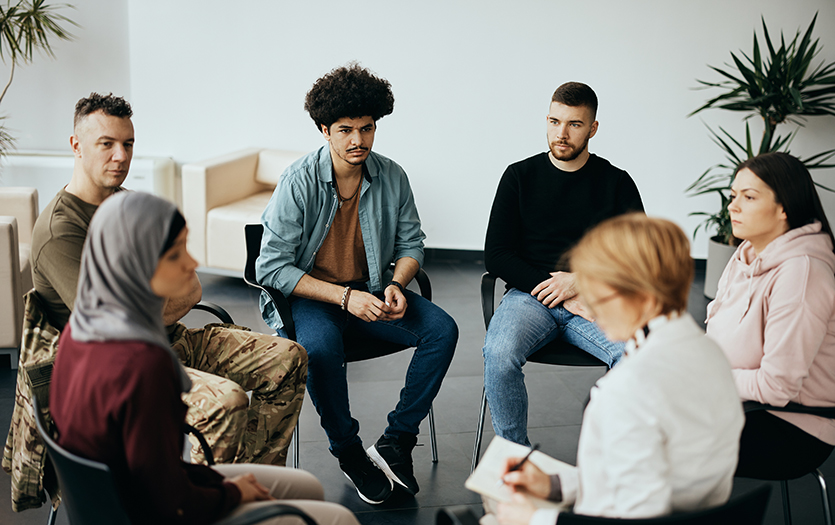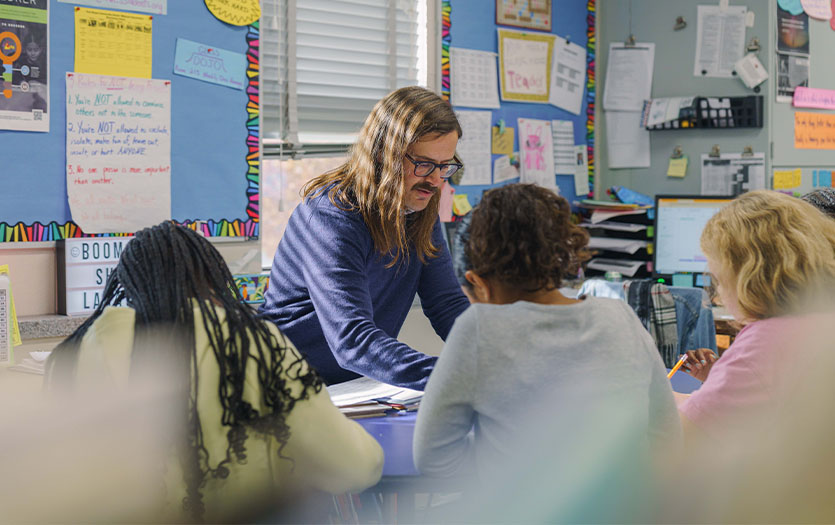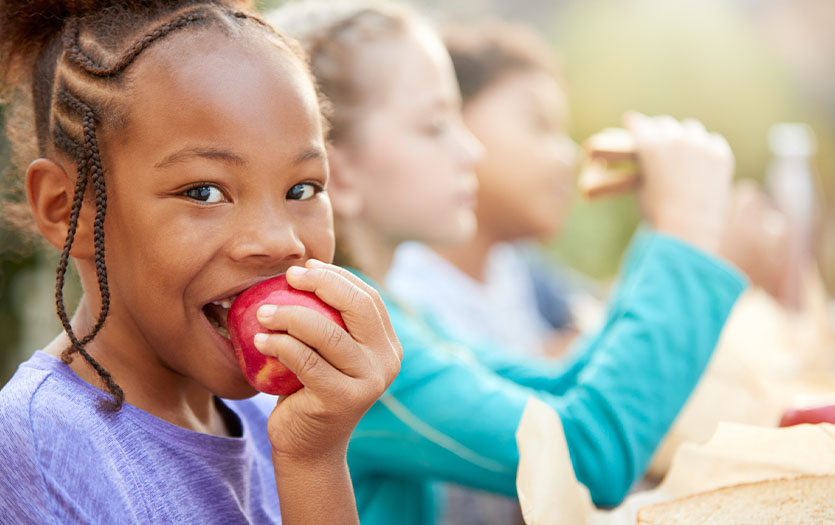
It happens so quickly … You get married, you have a few children, the demands of your job increase, the size and maintenance of your home grows, and before you know it, your spouse becomes a business partner. You are two ships in the night, working diligently to keep everything moving forward, often at the cost of your connection. It’s incredibly common, but Dr. Dave Johnson PhD, CNS, BC, LMFT, employee assistance specialist, has the fix. Mindfulness!
What is mindfulness?
Mindfulness is an awarenessing or awakening. It’s waking up to what’s taking place in the here, versus what’s happening on autopilot with our thinking, fears, concerns, worries, problem solving. On a very basic level, mindfulness is coming to now, coming to a nonjudgmental place, being curious, being aware. It’s about being intentional, coming out of the thinking and overthinking mind and turning on the intention to come to our senses; to see, hear, touch, taste smell, feel. To pay attention to what we’re feeling within. Are we quickened with fear or hope or love? It is the kindness, gentlest self-control. At its simplest form, mindfulness is being present.
Practicing mindfulness helps us cultivate our own GPS, our own sensibility when a button has been pushed or we’re into the fear-based, primitive brain of fight, flight or freeze. It gives us more control over our reactivity and we’re able to stay in important moments.
How can mindfulness help us be better partners?
When we practice mindfulness, we come to a balance, and stability of the mind and body. Often times, our relationships are fast paced because lives are grueling in terms of work and kids and expectations. We quickly go off and get hijacked. But when we focus on mindfulness, we’re able to attend to what’s happening in real time.
You can’t give what you don’ have, so if I’m locked in anger or fear, if I have resentment, if I have shame, guilt, if I don’t have self-esteem, if I don’t feel good about myself, it’s harder for me to be kind and compassionate to others, The first place to practice mindfulness is with yourself.
Being in a relationship is one of the hardest things we’ll ever do, whether we’ve been in it for two weeks or 40 years. As humans, we can always go off wire, especially if we’re hungry, tired or worried. We might say or do things we later regret. Mindfulness allows us to stay present and be aware of listening and responses.
How is active listening beneficial?
It starts with intention. If I’m in a relationship, and my intention is to be present, kind, respectful, and to show gratitude, actively listening shows my loved one that I value them. You want to give your partner what they need, desire, hope for. You want to give them the sensibility that you’re committed and connected, that you care and that they’re prized.
In counseling, we utilize lots of different approaches for relationship building, but at the basic level, it’s about being present to each other. It’s about the notion of deep listening. We all have a desire to be understood, to be truly listened to. Sometimes it’s a matter of looking into your partner’s eyes, coming to your senses, putting your electronics down so you aren’t distracted and coming to the pause so you can lean into the conversation and truly listen. You want to be with them in the moment. When we set that as the intention, the other person can feel it. It’s a quickening within us. Often times, in our brain, we’re thinking – especially in a problem-solving conversion – about our rebuttal. But with deep thinking about what our partner is saying, we hold that precious moment.
When we listen first to understand, from a mindfulness perspective, we cue into all the senses, not just the words coming out of our loved one’s mouth, but also how they said it, what their tone was, what their eyes were saying, what they're communicating through body language. If you’re still, you can notice what’s cuing up in them, and what’s cuing up in yourself. Listen to understand before ever try to formulate your own words.
Aside from counseling, how can couples get started?
I encourage folks to go to a workshop or pick up a book on mindfulness. People learn through tai chi or yoga or a religious tradition that encourages pause or Sabbath, the ability to be still. It could be something as simple as smelling tea, or just coming out of the problem-solving head. When we practice for 10, 12, 20 minutes a day, we realize how hard it is to stay there. We’re cultivating the mindful muscle, the capacity to sustain awareness for a period of time, to be curious, to be compassionate, to be present, and those are valuable skills in a loving relationship.
You can also sit next to each other and touch each other’s hand. We’re energy systems. Every cell within us moves. The heart beats, the lungs expand and when we touch each other physically, emotionally, spiritually, we move each other. We need to practice that capacity over and over. Date nights, where you’re able to go out without children to eat good food, without disruptions, to savor, to look into each other’s eyes, to ask the good questions, have the good dialogue, to have the deep listening, it’s a challenge to still ourselves enough and take the time to do that.

What is loving kindness affirmation?
I encourage people to write out a loving kindness affirmation, some words that connect to or affirm their goodness, their kindness, their compassion, their tenderness. To choose a word or two a phrase that grounds them in terms of how they want to be in a relationship. Then you can use that language as you practice mindfulness and stillness of presence to recall those feelings. Loving kindness meditation sets your intention in writing and practice. You can also write a letter to your partner about love, hope, gratitude. But when writing, come out of the thinking overthinking mind and see and feel the pen going across paper. The words become manifest within us and between us. I’m a firm believer in writing down what you’re trying to cultivate.
What is the role of gratitude?
The active practicing of gratitude is helpful in your physical, emotional, spiritual ad relational well-being. Practice first thing in the morning, when rising. As soon as you feel your body stir, ask what you are grateful for. You might be grateful for another day, or that you’re connected to the person next to you, or for the life you’re living, or for your children. Cultivate a mantra or words or sensibility about how you want to live that day. Those words then flow out of your mouth to people around you as well. It’s not our native tongue to show gratitude to ourselves or others. We have to practice.
How can we make our home a place of gratitude and compassion?
At the end of the day, when you come home, just like you take your shoes off, you should take your worries off. You’re entering into a room with somebody who’s very important to you. Close the door behind you and be there. It’s tough because of all the things you’re juggling – kids, cooking, messes – so it takes a lot of intention to attain a sense of peace and calm in the face of the storm that’s going to greet you. That’s why we practice. Come back to it time and time and time again.
Any other helpful insights on relationships?
I would say “tender” is a word we’re not utilizing enough in culture and relationships. We know what tenderness looks like; we see it with mom with baby. But ask yourself, “Am I kind and tender with others and myself?” Then you can draw upon that well of tenderness and bring it into your relationship. It’s one of my favorite words. It’s better than compassion, because compassion is messy and gets lost. With ourselves and with others. Think about your life coming to an end and reflecting on your purpose. We all know it’s not about money, prestige or climbing, it’s about whether we loved enough and were able to cultivate the wisdom of love. If I had 24 hours to live, if today was my last day on earth, I’m pretty sure I would choose more compassion, tenderness, kindness and respect for the people I call family and friend.



